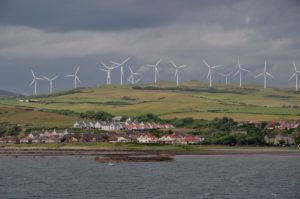In 2016, the UK generated 72% less electricity from coal than in 2011, which is great news for the climate and for communities around the world whose health and environment are harmed by coal mining.
Biofuelwatch has carried out the first ever analysis to find out what has compensated for the decline in coal burning. We wanted to know whether biomass has really played as big a role as many in the industry like to claim – or whether the government’s ‘dash for gas’, rightly condemned by climate justice campaigners, has compensated for the decline in coal.
What we discovered, however, is a far more hopeful story: Between 2011 and 2016, the UK’s electricity generation from wind and solar power trebled. Those genuinely low carbon renewables have compensated for 41% of the decline in coal power generation. Their contribution is followed by that of reduced electricity demand – accounting for 22% of the decline in coal electricity. The fact that Drax is now burning imported wood pellets made from over 13 million tonnes of wood a year does of course feature, too. However, the burning a total of more than 1.5 times as much wood in power stations annually as the UK produces ever year has only compensated for 21% of the decline in coal burning, far behind the role plaid by wind and solar power. As for electricity from gas, slightly less of that was produced in 2016 than in 2011.
Sadly, the positive trends – i.e. the major expansion in wind and solar power as well as greater energy efficiency and conservation – which are behind most of the UK’s partial coal phase-out will end unless Government policies which penalise onshore wind and solar power and which cut support for efficiency and energy conservation are reversed.
To read our full report, see here.

